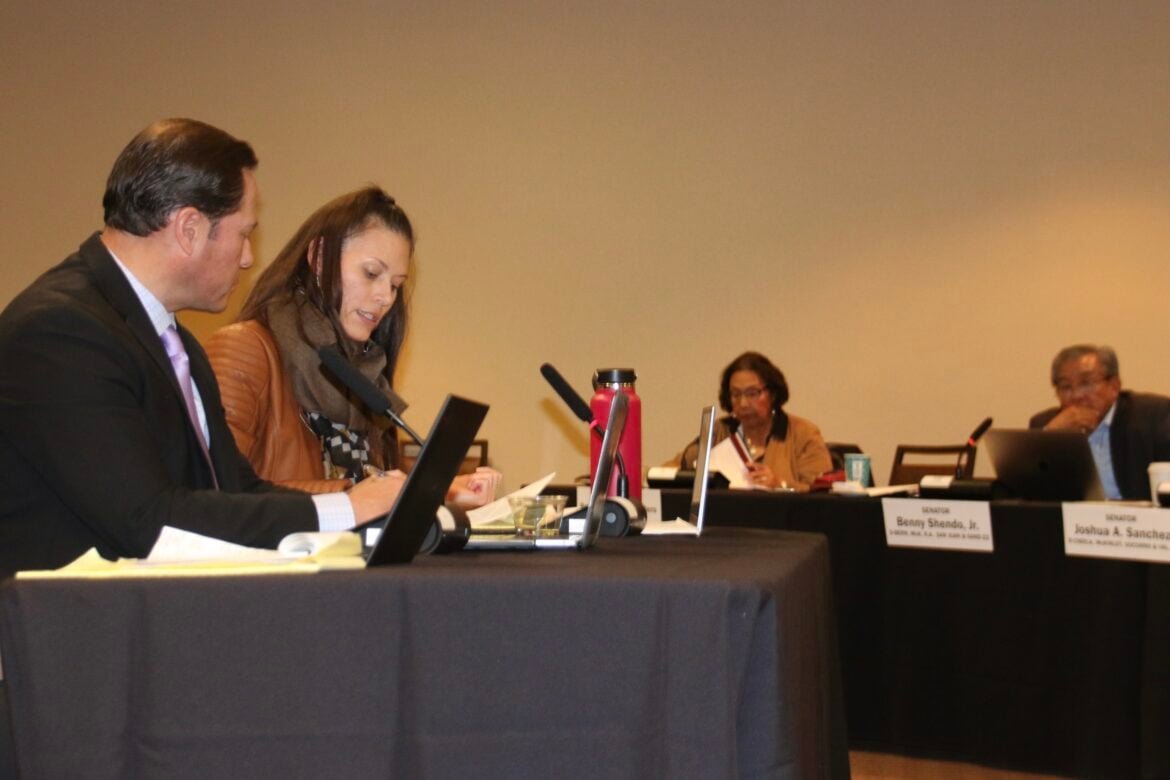This reporting was supported by the International Women’s Media Foundation’s Fund for Indigenous Journalists: Reporting on Missing and Murdered Indigenous Women, Girls, Two Spirit and Transgender People (MMIWG2T).
After a tumultuous tenure as Indian Affairs Secretary-designate, James Mountain is departing the agency to join Gov. Michelle Lujan Grisham’s office as her senior policy advisor for tribal affairs, her spokeswoman announced Friday.
Deputy Secretary Josett Monette will replace Mountain as Indian Affairs cabinet secretary.
Mountain’s departure comes about 10 months after several members of a state task force on missing and murdered Indigenous people — housed in the Indian Affairs Department — denounced his appointment. Since then, the governor has steadfastly rebuffed demands from task force members and some state lawmakers to replace Mountain.
It was unclear why Mountain departed and whose decision it was: Mountain’s or the governor’s. Cabinet secretaries serve at the pleasure of the governor. Neither the governor’s office nor the Indian Affairs Department gave a reason for Mountain’s departure.
Sen. Shannon Pinto, a Democrat from Tohatchi and citizen of the Navajo Nation, said Friday her stance on Mountain hadn’t changed since she told task force members during their February meeting that she opposed the appointment.
“There would’ve had to have been some real drastic progress on the issue,” Pinto told New Mexico In Depth, adding that Mountain’s appointment interrupted the state’s momentum in responding to the missing and murdered Indigenous people crisis.
Mountain’s troubles began after members of the task force learned he had been indicted in 2008 on charges of criminal sexual penetration, kidnapping and aggravated battery against a household member. The case was dismissed in 2010 because the prosecution said it had insufficient evidence to proceed to trial.
During the February meeting of the task force, some members said they were considering resigning in protest, explaining that his appointment threatened the work they’d done to build trust with affected Indigenous families and survivors of sexual violence.
The Navajo Nation Council and Navajo Nation President Buu Nygren also spoke out against Mountain’s appointment, which was announced Feb. 3.
Three months later, the governor’s administration disbanded the task force, surprising some members, who said they believed their work was only beginning, as well as Indigenous families with missing or murdered relatives.
More recently, Mountain, a former governor of San Ildefonso Pueblo, and the administration have faced criticism about the handling of the crisis of missing and murdered Indigenous people in New Mexico, particularly in light of the disbanding of the task force. Nearly 200 Native Americans are missing from the state and the Navajo Nation, according to an FBI list last updated in November.
In late November, Rep. Patricia Lundstrom, a Democrat from Gallup who represents a swath of the Navajo Nation, said during an interim legislative committee meeting she was “very disappointed” while several other legislators questioned Mountain and agency staff on how they planned to replace the task force, which was composed of several dozen members.
The administration announced the creation of a new advisory council last month and is asking for money to pay for four more full-time positions in the Indian Affairs Department. Those actions have not satisfied critics, who say it is lacking given the urgency of the crisis.
During the same meeting, Mountain told lawmakers he and the rest of the department have assessed what the task force was calling for, but added that he had “failed” in not putting together a “comprehensive plan” and a “measurable timeline of actions.”
Less than a week after the committee meeting, Indigenous advocates confronted Mountain and Monette at Missing in New Mexico Day, an annual event held to connect families with missing relatives and law enforcement. Advocates told him the department didn’t announce the date of the event early enough, leaving some families unaware it was happening.
Darlene Gomez, a member and attorney who represents affected Indigenous families pro-bono, said she hopes that communication improves under Monette’s leadership.
“All we can hope for is the best,” Gomez said Friday. “We want families and myself and different advocates to have a seat at the table.”
Mountain thanked Lujan Grisham for his chance to serve.
“Serving as the Cabinet Secretary for Gov. Lujan Grisham has been one of the greatest honors I have ever been asked to take on,” Mountain said in a statement Friday.
Monette, a member of the Turtle Mountain Band of Chippewa Indians, joined the department as general counsel in March and became deputy secretary in July. Previously, she was the New Mexico Legal Aid Native American Program Director.
“I am stepping into this role with deep commitment, dedication, care, and a profound respect for our Nations, Tribes and Pueblos and their homelands here in New Mexico. Working for Indian Country is where my dedication lies,” Monette said in a statement.
She added she has a “clear understanding” of the department’s responsibility “in oversight of New Mexico’s investments of millions of dollars, resources, and commitments to government-to-government relationships to our tribal communities.”
Mountain is the latest in a series of high-profile administration officials to leave their positions this year.
This is a developing story. New Mexico In Depth might update this story as we learn more.
This reporting was supported by the International Women’s Media Foundation’s Fund for Indigenous Journalists: Reporting on Missing and Murdered Indigenous Women, Girls, Two Spirit and Transgender People (MMIWG2T).
